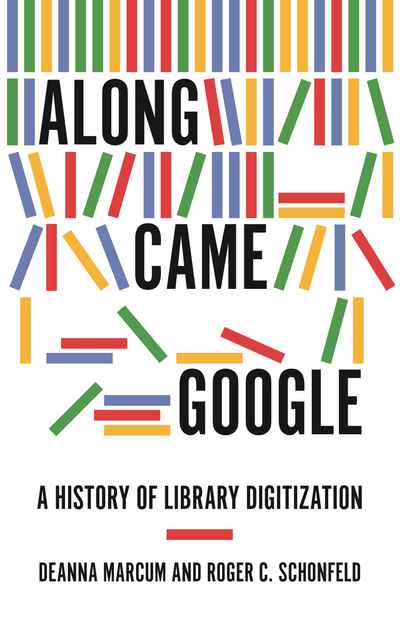Along Came Google: A History of Library Digitization

Paperback (Trade paperback US) | May 2023 | Princeton University Press | 9780691224374 | 232pp | 215x139mm | GEN | AUD$39.99, NZD$44.99
Hardback (B315) | Nov 2021 | Princeton University Press | 9780691172712 | 232pp | 234x155mm | RFB | AUD$54.99, NZD$64.99
An incisive history of the controversial Google Books project and the ongoing quest for a universal digital library
Libraries have long talked about providing comprehensive access to information for everyone. But when Google announced in 2004 that it planned to digitize books to make the world's knowledge accessible to all, questions were raised about the roles and responsibilities of libraries, the rights of authors and publishers, and whether a powerful corporation should be the conveyor of such a fundamental public good. Along Came Google traces the history of Google's book digitization project and its implications for us today.
Deanna Marcum and Roger Schonfeld draw on in-depth interviews with those who both embraced and resisted Google's plans, from librarians and technologists to university leaders, tech executives, and the heads of leading publishing houses. They look at earlier digital initiatives to provide open access to knowledge, and describe how Google founders Sergey Brin and Larry Page made the case for a universal digital library and drew on their company's considerable financial resources to make it a reality. Marcum and Schonfeld examine how librarians and scholars organized a legal response to Google, and reveal the missed opportunities when a settlement with the tech giant failed.
Along Came Google sheds light on the transformational effects of the Google Books project on scholarship and discusses how we can continue to think imaginatively and collaboratively about expanding the digital availability of knowledge.
'Readers will find a well-balanced perspective of this issue, covering ethics, finances, intentions, and a glimpse of the future. The book will be of interest to librarians, researchers, publishers, thought leaders, and those interested in digital technology.' — Booklist
'This book deserves recognition as the definitive history of the Google book digitization project.' — Jeffrey Garrett, ResearchGate
'This timely work examines the digitization of libraries and their transformation from collection builders to information access points...Recommended.' — Choice
'Marcum and Schonfeld have captured the excitement that surrounded the launch of what came to be known as the Google Books project. Along Came Google brings to life the history, controversies, successes, and failures of the collaboration between Google and its research library partners as they sought to create a vast, universally accessible digital library. This book is essential for those seeking to understand the role this undertaking played in the radical transformation of scholarly communications today.' — Karin Trainer, University Librarian Emerita, Princeton University
'When Google announced in December 2004 that it was partnering with five prestigious libraries to digitize millions of books, many saw this as an opportunity to realize the dream of a universal library, accessible to all. But Google’s bold plan quickly became bogged down in legal challenges, plunging Google into a long-running dispute with publishers and authors that lasted more than a decade. Marcum and Schonfeld’s well-researched account of the origins and consequences of the Google Books Library Project sheds valuable new light on this important if ill-fated venture. It is a key resource for anyone interested in the ongoing story of the impact of the digital revolution on the highly prized worlds of knowledge and culture.' — John B. Thompson, University of Cambridge
'This compelling book investigates the concept of the ‘dream of the universal library’ in the decades before, during, and following the judicial ruling on the Google Books project. Marcum and Schonfeld shape the story through a narrative that reveals the breathtaking scale of the project while situating it within a wider trend of legal and cultural challenges to mass digitization.' — Jessica Gardner, Cambridge University Libraries
